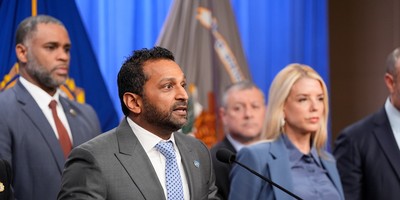True workplace democracy, in which workers vote about whether to join a union, is at risk. Karen Mayhew, who works for Kaiser Permanente in Portland, found herself stuck in a union against her will. The Service Employees International Union didn’t win an election. All it had to do was browbeat enough employees to publicly sign a union card.
Federal law requires a government-monitored election before any company can be forced to recognize a union, but Kaiser decided to accept the signed cards. Mayhew complained to the National Labor Relations Board (NLRB) and won a settlement requiring a secret-ballot election before Kaiser would recognize any union. Unfortunately, Democrats are pushing the misnamed Employee Free Choice Act, which would make union elections a thing of the past. Kaiser’s approach would become federal law, with mandatory recognition if a union collected cards from a majority of workers. No employee in America would be guaranteed a vote on joining a union.
Organized labor is frustrated. The proportion of workers who belong to unions peaked in the 1950s. Today just 12 percent of the American workforce is unionized. Only among government employees are unions growing.
Organized labor has been losing its hold over workers because the economy is evolving. Workers increasingly recognize that cooperation rather than confrontation between employers and employees is necessary to increase productivity and flexibility. High-cost, antiquated work rules damaged America’s manufacturing industries. A new approach is necessary to succeed in today’s global economy.
Recommended
Unfortunately, “change” is not a concept that labor organizers believe in. The results have been clear as employees increasingly reject calls for unionization. If unions collect signed cards from 30 percent of workers, a secret-ballot election must be held. But Big Labor typically loses if it only collects the minimum number of cards, so union operatives rarely call for an election unless they get far more than a majority of cards. Even then, they lose nearly half of the votes.
The problem is the message. Unions try to redistribute a shrinking economic pie rather than expand the pie. That wasn’t a good approach in the old industrial economy. It’s an awful strategy in today’s global economy.
But union officials have a different diagnosis. The problem is elections.
In the view of labor organizers, secret ballots are unfair. Companies can make the case against the union. Employees are protected from intimidation. Workers have free choice. Too many times they vote the “wrong” way.
The obvious answer is to stop employees from voting. Bruce Raynor of the union UNITE HERE said simply: "There's no need to subject the workers to an election." Providing intellectual cover for this Soviet-style approach was the Nation magazine: "Simple recognition when a majority of workers sign cards is a more democratic process" than holding an election. Black is white. Voting is undemocratic.
The solution to labor is called “card check.” If unions can convince a majority of workers to sign up, the union wins. No vote is necessary.
Labor claims that companies intimidate outspoken labor activists, but the NLRB finds few cases of retaliatory firings. Real intimidation comes from union activists, who routinely pressure workers to sign up. Organizers often deceive employees as well, saying that the cards are only requests for information.
Worker complaints are legion. Female employees appear to be particular targets for intimidation. For instance in a case against the Hotel Employees and Restaurant Employees Union, housekeeper Faith Jetter filed a court declaration detailing union harassment: calls to her home, pressure to sign the card, and of organizers seeking personal information on her and misleading other employees on the meaning of signing. She explained: “If this union was going to come into the workplace, I would absolutely want to have a secret ballot election so that me [sic] and my fellow employees could vote our consciences in private, without being pressured by the union representative. I would also want to hear all sides of the story, not just the union’s side.”
But that’s not what labor organizers want. Mark Mix of the National Right to Work Committee warns that “Without even the limited protections of secret ballot elections, card-check allows aggressive unions to acquire monopoly bargaining privileges in an environment that makes it nearly impossible for employees to say ‘no’ to unionization.”
Workers have a right to join a union. But they also have a right not to join. The best way to determine what workers want is to let them vote. Congress should reject the so-called Employee Free Choice Act, which is an attack on workers’ basic right to choose.

























Join the conversation as a VIP Member